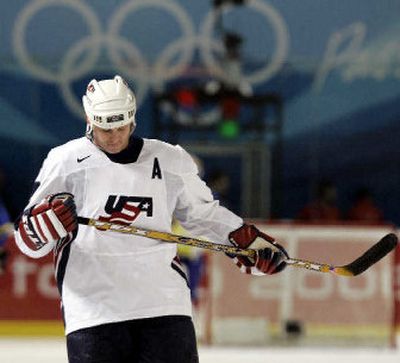U.S. offense ice cold

TURIN, Italy – Twenty-six years after the greatest upset in the history of international hockey comes a new breed of U.S. player. He is older, has a side job that pays more handsomely than those dormitory-fed Miracle on Ice kids in 1980 and his team is almost certain not to have a movie made about it.
U.S. Olympic hockey fans knew their team was a long shot for gold, given the caliber of competition, the roster’s mix of old and new and little practice time to build a cohesive offensive juggernaut. But the United States has scored only two goals in its last two games after Sunday’s 2-1 loss to Sweden, a power outage that has afflicted almost every scorer and left the Americans thankful they play in a bracket featuring Kazakhstan and Latvia.
The United States (1-2-1) meets Russia in its final preliminary game Tuesday. It would have to lose to the Russians and have Latvia, which plays Kazakhstan, overcome a 14-goal deficit in combined scoring to miss advancing to the single-elimination, eight-team medal round.
But without more scoring, the U.S. team’s medal prospects are dim. The Americans couldn’t defeat a Swedish team playing without star Peter Forsberg, who is still recovering from a groin injury.
“It’s simple, we got to put the puck in the net,” American forward Doug Weight said.
Twice in the second period Sweden was at a two-man disadvantage – a total of 3 minutes 38 seconds – and twice the United States could not score.
“I think some of the execution isn’t there,” said U.S. defenseman Brian Rafalski. “We’re looking for too much and making things more difficult. The power play was the difference.
“They scored on theirs in the third and we didn’t score on ours in the second. Obviously we have to get over that, make sure we know what we’re doing.”
Swedish forward Mikael Samuelsson scored 25 seconds into a power play with less than 16 minutes left in the game to break a 1-1 tie. Out-shot 26-25, the U.S. players were more scrappy than efficient, too often settling for long slapshots at Henrik Lundqvist. The New York Rangers goalie allowed only a first-period goal by Mike Modano.
U.S. goaltender Rick DiPietro again played well. He shut out Sweden from about the eight-minute mark of the first period, when Daniel Alfredsson beat him for the game’s first goal, until Samuelsson’s game-winner. But the overall tenor of the U.S. team was that it needed to find a rhythm that would translate into goals.
“When you don’t score, that doubt does creep into your head,” Modano said.
The U.S. team has scored nine goals in four games. It also had a 5-on-3 opportunity against Latvia and failed to score for nearly four minutes.
Sweden (3-1) has a spot in the medal round locked up out of Group B, as do Russia and Slovakia. The fourth-place Americans seem likely to join them. How long they will play after that remains to be seen.
Chris Chelios was asked what the team could do to remedy its goal-scoring output.
“Watch some tapes,” he said, bluntly. “Figure it out.”